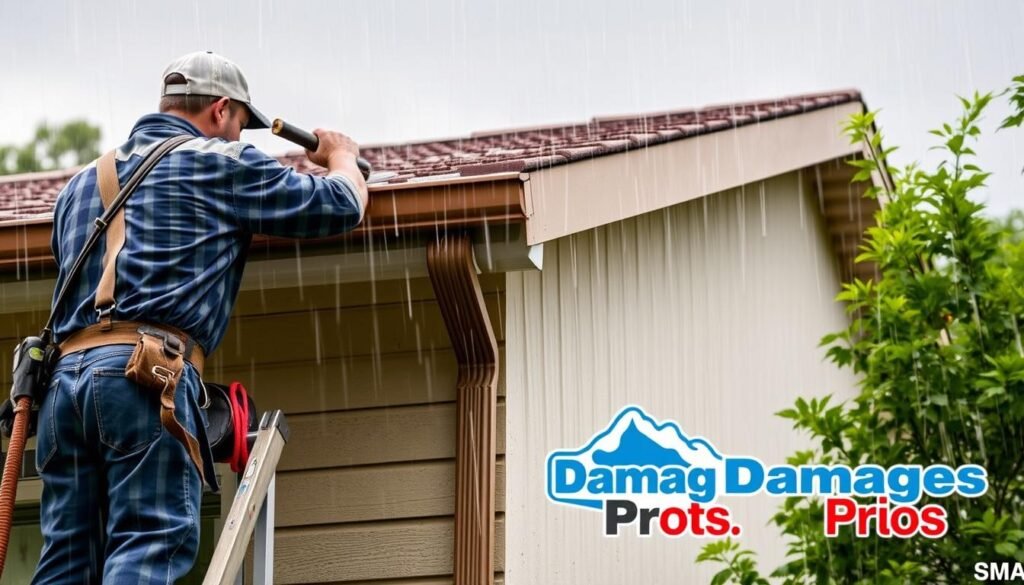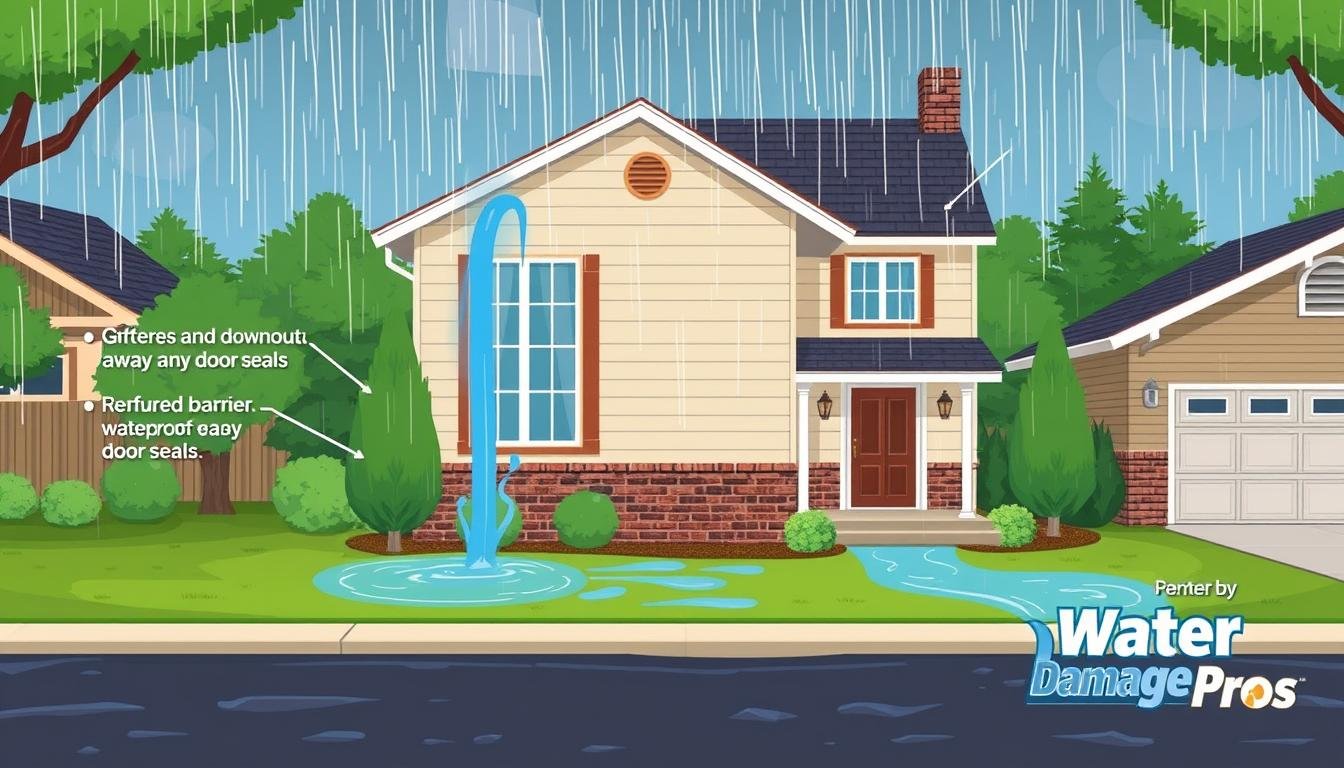According to the Insurance Information Institute, non-weather related water damage is a big problem. It’s the second leading cause of insurance loss claims, making up over 24% of homeowners’ claims from 2018-20221. Water damage can be very damaging, but catching it early and taking steps to prevent it can help a lot. In this article, we’ll look at some key tips to help you prevent water damage during heavy rainfall and keep your home dry and safe.
It’s important to regularly check hoses, pipes, and faucets for leaks. More than half of non-weather water damage claims are due to plumbing issues1. Also, watching your water bill for unexpected changes can help spot hidden leaks. Don’t forget to schedule regular checks for your water heater, boiler, and air conditioning units to catch and fix any problems quickly before they cause water damage.
Keeping your home’s drainage systems in good shape is also key. Experts say to clean your gutters at least twice a year to stop water from seeping into your home1. It’s also wise to regularly check your roof to find and fix any spots where water might get in1. Make sure to test your sump pump at least once a year, and more often during heavy rain, to ensure it’s working right1. Also, think about getting a leak detection and/or automatic water shut-off system to add extra protection against water damage1.
Key Takeaways
- Non-weather related water damage accounts for over 24% of homeowners’ insurance claims.
- Regular plumbing and appliance inspections can help identify and fix issues before they lead to water damage.
- Proper maintenance of gutters, downspouts, and the roof is crucial to prevent water intrusion.
- Sump pump testing and potential installation of leak detection systems can provide added protection.
- Addressing drainage issues around the foundation can help prevent water pooling and seepage.
Safeguard Your Home from Water Damage During Heavy Rainfall
When heavy rains hit, a well-maintained sump pump is your home’s first defense against water damage. It’s important to regularly test the sump pump, clean the pit, and check the discharge line2. A broken sump pump can cause basement flooding, which is expensive and stressful to fix.
Maintain Your Sump Pump
To keep your sump pump working well, follow these steps:
- Test the pump by filling the sump pit with water and checking if it turns on and drains the water correctly.
- Clean the sump pit to remove any debris that could block the pump or hinder its operation.
- Check the discharge line for any blockages or damage, making sure water is directed away from your home’s foundation.
Keeping your sump pump in good condition is a simple yet effective way to protect your home from water damage during heavy rain2.
Clean Your Gutters and Downspouts
Clogged gutters and downspouts can cause water to overflow and pool around your home’s foundation, leading to water damage3. Regular gutter cleaning and checking for damage can ensure water flows away from your home as it should3. Installing gutter guards can also reduce cleaning needs and protect your home from water intrusion2.

By maintaining your sump pump and keeping your gutters and downspouts clear, you can effectively safeguard your home from water damage during heavy rainfall. These proactive steps can help prevent costly repairs and give you peace of mind during severe weather events23.
Prevent Water Damage Heavy Rainfall: Essential Strategies
Keeping your home safe from heavy rain is key. You should check your foundation for cracks and make sure your yard is graded right.
Inspect Your Foundation for Cracks
Cracks in your foundation let water in, causing damage and mold. Check your foundation often for cracks and seal them quickly with waterproof sealant.4 Homes in flood areas are 24 times more likely to get water damage than those in safer places4.
Ensure Proper Grading Around Your Home
It’s important to grade your yard right to keep water away. Aim for a slope of 1 inch per foot for 6 feet from your foundation5. This helps keep water out of your foundation and prevents yard flooding54. Keeping gutters and landscaping in check can cut water damage risk by 70%4.
By inspecting your foundation and grading your yard right, you can lower water damage risks. These steps protect your home and give you peace of mind.
Conclusion
Preparing your home for heavy rain is key to avoid water damage. Start by keeping your sump pump working well. Also, clean your gutters and downspouts often. Check your foundation for cracks and make sure your yard slopes away from your home6.
Working with a trusted plumbing company like Water Damage Pros – San Bernardino (951-903-5429) is also smart. They can help with water damage prevention and emergency plans.
Emergency planning is vital to protect your home from rain damage. Being proactive can save you time, money, and stress7. Take action now to keep your home safe from unpredictable weather.
With the right steps and a good plumbing partner, your home will be ready for any storm. This gives you peace of mind and protects your biggest asset.
FAQ
What are the most common causes of water damage in homes during heavy rainfall?
How can I prevent water damage to my home during heavy rain?
Why is a sump pump important for preventing basement flooding?
How can I prevent water from seeping into my basement or crawl space?
What should I do to prepare my home for heavy rainfall?
Source Links
- https://www.unionmutual.com/tips/8-tips-for-preventing-non-weather-related-water-damage/
- https://www.iii.org/article/how-protect-your-home-water-damage
- https://titanrebuild.com/home-rain-related-water-damage/
- https://www.puroclean.com/marco-island-fl/blog/tips-florida-homeowners-prevent-water-damage/
- https://www.servpro.com/resources/flooded-yard-prevention
- https://idryrestorations.co.nz/how-to-prevent-water-damage-during-heavy-rainfall-and-storms/
- https://staysafe.org/home-safety/home-water-damage-prevention-protecting/


